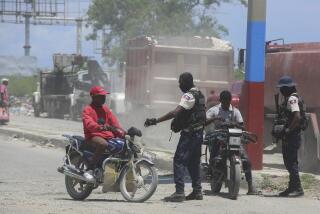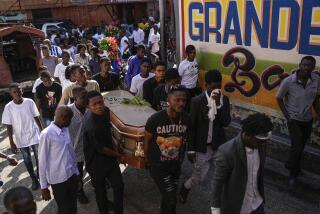U.S. Soldier Dies, Another Hurt in Gunfight in Haiti
- Share via
PORT-AU-PRINCE, Haiti — An American soldier was killed Thursday by Haitian civilians near the northern city of Gonaives, the first member of the U.S. military to die in a gunfight since American forces arrived here four months ago.
Details of the incident were vague and incomplete, but U.S. military and embassy officials said another American soldier was wounded, a Haitian civilian was killed, and a second civilian was arrested.
No identities were released, but Maj. Cindy Sito, a spokeswoman for the U.S. forces here, said the American troops belonged to the Army’s 3rd Special Forces group based in Gonaives, a port city about 100 miles north of Port-au-Prince.
Special Forces units, specifically trained for civil control and “psychological” operations, are stationed throughout Haiti, while the bulk of the American troops are kept in Port-au-Prince.
According to Sito, two U.S. soldiers were standing near a makeshift tollbooth on the southern edge of Gonaives when a white Ford pickup truck, carrying three men in civilian clothes, drove through the checkpoint without stopping.
The soldiers, armed with assault weapons, forced the vehicle to a halt and approached the truck, one on each side. One of the passengers got out “brandishing a weapon and shot one U.S. soldier in the chest and another in the arm,” Sito said.
The American wounded in the arm returned fire, killing the passenger, she said. He also managed to detain the driver until reinforcements arrived. The driver was arrested and flown to a U.S. Army detention center in Port-au-Prince. The third civilian escaped.
The two Americans were flown by helicopter to a Port-au-Prince field hospital, where the soldier who had been shot in the chest died, Sito said. There was no information on the status of the second man.
*
Members of Justice and Peace, a Haitian civil rights organization with a branch in Gonaives, said the civilians were members of the Front for the Advancement and Progress of Haiti, a Haitian army-sponsored terrorist group known as FRAPH that supposedly had disbanded since the U.S. intervention.
A Radio Metropole reporter in Gonaives said the dead Haitian was a retired army major from Cap Haitien who had opened fire with a .45-caliber pistol.
Another source said the dead Haitian was Jules Cesar, a FRAPH leader in Gonaives who at one time served as bodyguard to national FRAPH leader Emmanuel Constant.
Nearly 25,000 American troops were stationed here in the wake of the U.S. intervention that began Sept. 19 to restore ousted President Jean-Bertrand Aristide. But the figure has dropped to about 6,000, with that force to be reduced to about 2,000 in March.
Three U.S. soldiers involved in the international peacekeeping effort have committed suicide since the occupation began. And one American, a translator for the international police force, was killed in an accident.
But in spite of some vocal threats and a disgruntled 7,000-member Haitian army, there is only one recorded attack on American forces before Thursday: the wounding of another Special Forces soldier at Les Cayes, a city on Haiti’s southwestern peninsula.
The U.S. Embassy, which has been constantly promoting the view that “there is a secure and stable security environment” here, sought to play down the significance of Thursday’s incident.
*
Embassy spokesman Stanley Schrager told Radio Metropole the shooting “was an isolated incident, not really aimed at the (American) military presence in Haiti.”
Aristide issued a statement offering condolences for the soldier’s death and pledging that the incident “will not derail the process of peace and reconciliation” in Haiti.
U.S. diplomats have taken pains to downplay the possibility of U.S.-Haitian conflicts or the suggestion that U.S. forces are in any real danger, because the replacement of the existing 6,000 American troops by U.N. peacekeepers depends on the guaranteed establishment of “a safe and secure environment.”
In addition, U.S. officials say that the deaths of American soldiers have potentially troublesome political implications in the United States, pointing to continued opposition to the Haiti operation by such powerful Republican Party figures as Senate Majority Leader Bob Dole of Kansas and Senate Foreign Relations Committee Chairman Jesse Helms of North Carolina.
“The concern has always been that, if Americans start dying in battle here, (President) Clinton will come under real pressure to pull out,” one U.S. official said. “What happened today was a tragedy, and probably inevitable, but it shouldn’t be seen as the beginning of widespread or serious threats to our people.”
Justice and Peace issued a statement saying the Gonaives incident was a result of a failure by the U.S. forces here to disarm such groups as FRAPH.
The claim that U.S. troops have not aggressively rounded up arms is given wide credence by Haitians and is of serious concern to some who fear that the old Haitian military and its allies will use hidden weapons to destabilize the Aristide government when the foreign forces leave.
More to Read
Sign up for Essential California
The most important California stories and recommendations in your inbox every morning.
You may occasionally receive promotional content from the Los Angeles Times.













